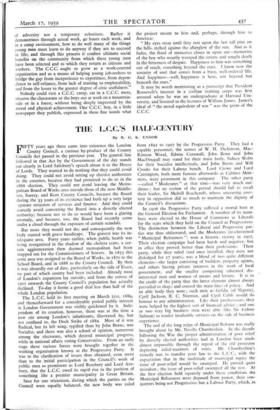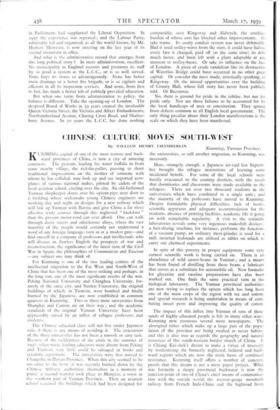THE L.C.C.'S HALF-CENTURY
By R. C. K. ENSOR
FIFTY years ago there came into existence the London County Council, a curious by-product of the County Councils Act passed in the previous year. The general line followed in that Act by the Government of the day stands out clearly in Lord Salisbury's speech about it to the House of Lords. They wanted to do nothing that they could avoid doing. They could not avoid setting up elective authorities in the counties, because they had promised to do so in the 1886 election. They could not avoid leaving the Metro- politan Board of Works area outside those of the new Middle- sex, Surrey, and Kent County Councils, because the Board during the 33 years of its existence had built up a very large separate structure of services and finance. And they could scarcely avoid converting the Board into a directly elected authority; because not to do so would have been a glaring anomaly, and because, too, the Board had recently come under a cloud through the exposure of certain scandals.
But more they would not do; and consequently the new body started with grave handicaps. The gravest was its in- adequate area. Forty years earlier, when public health was being reorganised in the shadow of the cholera scare, a cer- tain agglomeration 'then deemed metropolitan had been mapped out for the Commissioners of Sewers. In 1855 this same area was assigned to the Board of Works, in 1870 to the School Board, and in 1888 to the County Council. By then it was absurdly out of date, particularly on the side of Essex, no part of which county had been included. Already most of London's expansion lay outside; and from the census of 1901 onwards the County Council's population has actually declined. To-day it forms a good deal less than half of the whole London population.
The L.C.C. held its first meeting on March 21st, 1889, and thenceforward for a considerable period public interest in London Government was visibly quickened by it. Inde- pendent of its creation, however, there was at the time a new stir among London's inhabitants, illustrated by, but not confined to, the Dock Strike of 1889. Most of it was Radical, but its left wing, typified then by John Burns, was Socialist, and there was also a school of opinion, numerous among the electorate, which desired municipal progress, while in national affairs voting Conservative. From an early stage these various forces were brought together in the working organisation known as the Progressive Party. It was to the clarification of issues thus obtained, even more than to the initial participation in the Council's work of public men so prominent as Lord Rosebery and Lord Ave- bury, that the L.C.C. owed its rapid rise to the position of something like a premier municipality in Great Britain.
Save for one triennium, during which the parties on the Council were equally balanced, the new body was ruled from 1892 to 1907 by the Progressive Party. They had a capable personnel; the names of W. H. Dickinson, Mac- Kinnon Wood, Edwin Cornwall, John Benn and John MacDougall may stand for their main body, Sidney Webb for their Socialist intellectuals, and John Burns and Will Crooks for their Labour bench. Lord Crewe and Lord Carrington, both more famous afterwards as Cabinet Mini- sters, were prominent in this company The other party —called " Moderates " at that time—was very much out- shone ; but no review of the period should fail to recall their leader, Sir Melvill Beachcroft, whose unceasing cour- tesy in opposition did so much to maintain the dignity of the Council's discussions.
In 1906 the Progressive Party suffered a mortal hurt at the General Election for Parliament. A number of its mem- bers were elected to the House of Commons as Liberals for the seats which they held on the Council as Progressives. The distinction between the Liberal and Progressive par- ties was thus obliterated, and the Moderates (re-christened " Municipal Reformers ") won a historic victory in 1907. Their election campaign had been harsh and negative, but in office they proved better than their professions. Their party, while they ruled (and once installed, they were not dislodged for 27 years), was a blend of two quite different elements—the larger consisting of builders, property agents, and others having private interests in the work of local government, and the smaller comprising educated dis- interested men and women of means and leisure. It is to the credit of the party that the latter clement almost always prevailed to shape and control the main lines of policy. And an able body they were ; such men as Goldie (of Nigeria), Cyril Jackson, R. C. Norman, and Cyril Cobb would do honour to any administration. Like their predecessors, they were helped by the highest sort of financial advice ; and one or two very big business men were able (like Sir Isidore Salmon) to render invaluable services on the side of business experience.
The end of the long reign of Municipal Reform was really brought about by Mr. Neville Chamberlain. In the decade following the War the proper administration of poor relief by directly elected authorities had in London been made almost impossible through the repeal of the old provision depriving relief-receivers of votes. Mr. Chamberlain's remedy was to transfer poor law to the L.C.C., with the expectation that in the multitude of municipal topics the issue of poor-relief would be swamped. He proved quite mistaken ; the issue of poor-relief swamped all the rest. At the first election held squarely under these conditions the Municipal Reformers were deposed from power, their con- querors being not Progressives but a Labour Party, which, as in Parliament, had supplanted the Liberal Opposition. In 1937 the experience was repeated ; and the Labour Party, admirably led and organised, as all the world knows, by Mr. Herbert Morrison, is now entering on the last year of its second triennium in office.
And what is the administrative record that emerges from this long political story ? In mere administration, excellent. No municipality in England recruits and promotes its staff by so good a system as the L.C.C., or is so well served. None buys its stores so advantageously. None has better main drainage or a better fire brigade, or is so vigilant and efficient in all its inspection services. And none, from first to last, has made a better job of publicly provided education.
But when one turns from administration to policy, the balance is different. Take the opening-up of London. The despised Board of Works in 33 years created the invaluable Queen Victoria Street, the Victoria and Albert Embankments, Northumberland Avenue, Charing Cross Road, and Shaftes- bury Avenue. In 5o years the L.C.C. has done nothing comparable, save Kingsway and Aldwych, the crushing burden of whose cost has blocked other improvements. a take trams. Its costly conduit system was never defensible Had it used trolley-wires from the start, it could have halves every fare it charged, paid off (at the same time) its debt much faster, and been left with a plant adaptable at any moment to trolley-buses. Or take its influence on the face of London. A piece of crude vandalism like its destruction of Waterloo Bridge could have occurred in no other great capital. Or consider the mess made, artistically speaking, of Kingsway. Or the missed opportunities over the building of County Hall, whose full story has never been publicly told. Or Becontree.
No, there is ground for pride in the jubilee, but not for pride only. Nor are those failures to be accounted for by the local handicaps of area or constitution. They sprang from defects common to all English local government. The only thing peculiar about their London manifestations is the scale on which they have been manifested.











































 Previous page
Previous page